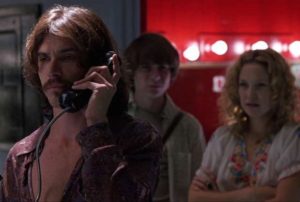2000. 122 minutes. Rated R.
And you can tell Rolling Stone magazine that my last words were… I’m on drugs!

William Miller (Patrick Fugit) is a 15-year-old whiz kid who uses his wits to tag along with up-and-coming rockers Stillwater. Under the auspices of a Rolling Stone article, he becomes a fixture on their tour, participating in a rowdy rock and roll lifestyle with increasing abandon, and putting off the moment when he must betray his new friends in print. But as he begins to understand the destructive side of fame, William’s responsibilities come home.
Initially, neither the Allman Brothers-type rockers nor queen rock muse Penny Lane (Kate Hudson) realize exactly how young Miller really is, but they do know that he is starry-eyed and connected to the publishing industry. Because they believe that he’s likely to treat them well, they consider him not a leak but a ticket. This is typical of Almost Famous: for most characters, fame is such a defining priority that it blinds the people who desire it. People who can’t assist on the acquisition of fame–including Penny Lane–are often discarded with brutal callousness.
Old beyond his years, William is basically an inexperienced adult. He already understands the sacrifices that grown-ups make but isn’t prepared for them emotionally. As the accountability of the Rolling Stones article looms, William’s adventures with Stillwater gradually take on the tone of a fun romp gone terribly wrong.
In many ways, the band is exactly like William in attitude: though they began their artistic endeavor for fun, desire for fame and the reckoning of responsibility to the music company gradually overtake their own enjoyment. The film does a decent job of demonstrating that their internal bickering and almost sociopathic lack of interest in Penny Lane are products of their lifestyle, but a viewer can gather that William would become just as jaded over time.
The film is recognizable as an homage to the seventies, and music fans will enjoy seeing transparently fictionalized representations of bands that would become beloved. William is a bare stand-in for Cameron Crowe, the author and director, who began his own career in pretty much exactly the same way (the first article Crowe ever wrote for Rolling Stone was a cover story on the Allman Brothers. He was sixteen; it’s still good reading today). This accounts for the film’s depth and insight into a world so romanticized by the people outside of it, as well as the nostalgia clear in scenes like the acid-fueled rooftop dive (far from the horrifying experience it must have been at the time, this is the single funniest event in the entire movie–exactly the way you’d tell it eleven years after the fact.)
All of this philosophical nonsense actually disguises how funny most of the film really is. William and his cohorts crash gates and parties, dance on tables, and field multiple hilarious calls from William’s mother (Frances McDormand). It’s exactly the kind of coming-of-age story you want: fun enough to remind viewers of a more innocent time, and serious enough to remind viewers about why they’re so glad that time is gone.
Writers and rock fans alike will find Almost Famous a great way to spend two hours. Viewers with no background or interest in either may find themselves developing one after seeing this great little movie by a big insider name.
